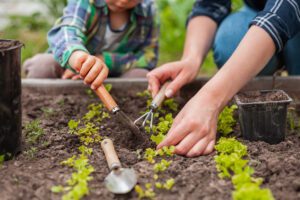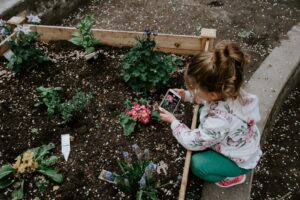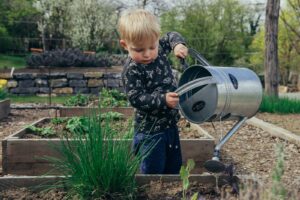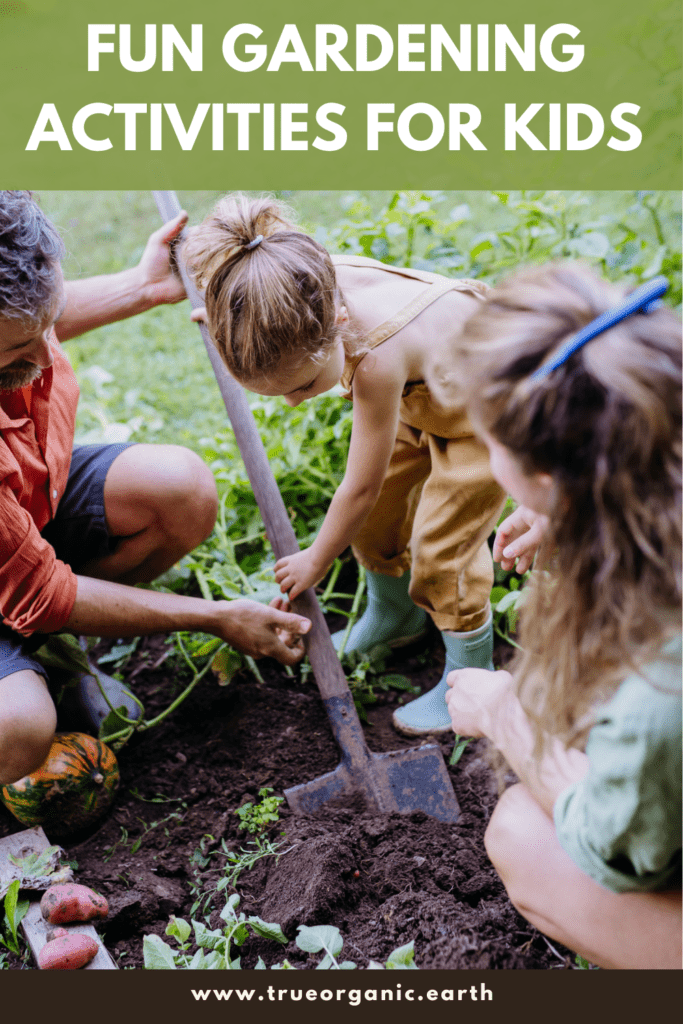September 23, 2022
True Organic Fun Gardening Activities for Kids
Fun Gardening Activities for Kids
Want to help kids grow their emotional and cognitive skills, apply academic principles, get outside, and learn to love fruits and veggies? Get them into the garden!
Getting kids gardening during early childhood and beyond is incredibly beneficial — read about why in our interview with school garden expert, Christina Abuelo. It’s not just math and science skills that kids can learn as they experience gardening, but also social-emotional skills, problem-solving, nature-based nervous system regulation, cooperation, patience, and more.
Here are some ideas to kick off the fun and learning.
Play Garden Bingo
Every parent, teacher, and babysitter knows that kids love to find stuff! And there’s plenty to find in the garden. Bees, worms, birds, leaves shaped like hearts, leaves shaped like arrows, all the colors of the rainbow…these are just a handful of items you can put on a garden bingo card.
Download and print this blank bingo card, then fill in your own ideas. A game of bingo encourages kids’ curiosity and gets them exploring independently, and can help them learn about identifying different plants and wildlife.
 Keep A Garden Journal
Keep A Garden Journal
Keeping a garden journal is a great way for kids to feel more connected with the natural world. (And garden journals are great for grown-up gardeners, too! Check out our blog on creating your own garden journal.)
Ask kids to write about what they see in the garden: What kind of bugs and birds are in the garden today? Did the plants grow, get new leaves, or produce more fruit?
Give kids a framework or template for their journals and let them explore!
Here are some ideas for more fun activities for a kids’ garden journal:
- Drying flowers and/or seeds, taping or pasting into journals, and labeling
- Tracking plants’ growth and yield
- Measuring rainfall and watering schedules
- Drawing and coloring plant pictures
- Writing about how they took care of the garden
- Writing about how the garden makes them feel or what they learned.
Math is more fun in the garden!
…And it “sticks” better, too!
Everyone learns and retains information in different ways, but for most people, doing something hands-on to learn an intellectual concept really helps it sink in. For kids who are visual or experiential learners, a garden provides opportunities to practice math skills in a way that might be retained more effectively.
Measuring, mixing, counting, and calculating are all easy to do in the garden.
For kids who are just learning numbers, counting how many tomatoes one plant has produced or how many ladybugs are crawling on a flower is a perfect activity.
A little older, and they’ll love measuring and recording the heights or weight of plants and fruits (which they can record in their garden journals).
For older kids who are learning 4th or 5th-grade math skills, help them measure and calculate square footage of garden beds or containers.
When it’s time to learn averages and medians, kids can calculate the average yield of fruiting crops or the median height of tomatoes…you’ll find that math problems in the garden are endless!
For kids who are ready to handle plant foods, a parent or teacher can supervise as they measure, mix, and apply soil supplements (just make sure it’s a certified Food Safe, organic plant food like True Organic).
Vegetable and Fruit Tasting
Nurture healthy palates and encourage budding chefs by helping kids harvest, prepare, and taste garden crops.
Christina Abuelo of Barrio Botany has seen first-hand how empowering kids to grow and eat their own food helps them develop taste buds that crave fresh veggies.
She suggests a “taste test” activity where kids get to try different flavor combinations, then vote on their favorites and explain what they liked or didn’t like. Kids love to express themselves, and it’s important for their development!
Not only that, Christina Abuelo says, “There’s something about being the one in charge. Harvesting something and cooking vegetables themselves makes the kids more excited about trying new flavors.”
Give kids a few different vegetables with dips and let them express their favorites. (Christina Abuelo suggests carrots, lettuce, and cucumbers dipped in hummus.)
This works great in school classrooms or summer camps or in any group of kids who are learning to express their preferences, nourish themselves independently, listen to others’ opinions, and try new things.
Older students can have fun developing their own recipes, too!
 Gardening With Wee Ones
Gardening With Wee Ones
What about really little kids? Yes, toddlers can learn and play and help out in the garden! Little kiddos are at peak curiosity age. Help them with some simple activities like:
- Watering
- Planting seeds
- Sorting and cleaning planters and containers
- Identifying bugs and plants.
Remember to Have Fun!
Don’t get caught up in making it fancy or perfect. Start small! Just the joy of being outside, playing in the “dirt” will spark curiosity and creativity.
Remember: gardening isn’t about perfection. It’s about learning, connecting with nature, having fun, making mistakes, and encouraging kids to explore the world around them.
Show us your True Organic Plants
#GrowWithTrue
www.trueorganic.earth


 Keep A Garden Journal
Keep A Garden Journal Gardening With Wee Ones
Gardening With Wee Ones
